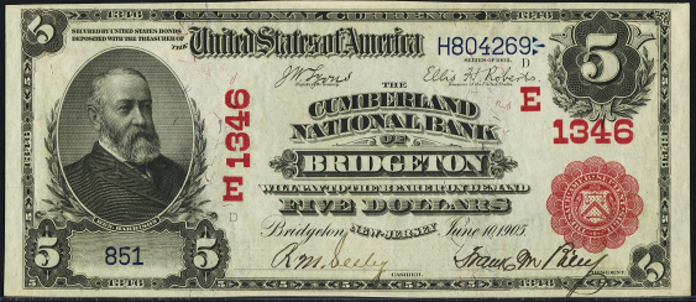Five Dollar Notes › Nationals › 1902 Five Dollar National Bank Notes › Kansas Charters › 1902 $5 Cherryvale Kansas Peoples National Bank
Get Value Now
| Item | Info |
|---|---|
| Series | 1902 |
| Charter | #7383 Peoples National Bank of Cherryvale, Kansas |
| Year Chartered | 1904, 460 Banks Chartered |
| City Info | Cherryvale is a city in Montgomery County, Kansas, United States. As of the 2010 census, the city population was 2,367. Cherryvale was founded on the land of the Osage Indians who were pushed out by veterans of the American Civil War looking for land. The first white man to purchase property and settle here was Mr. Abe Eaton, who later sold it to the Kansas City, Lawrence & Southern Kansas Railroad which then became the Leavenworth, Lawrence & Galveston Railway. The town site was platted by the railroad in 1871. It was named Cherryvale from its position in the valley of Cherry Creek. Source: Wikipedia |
| Similar Cities | If your note doesn't match try: 1. Cherryvale, Kansas - First National Bank 2. Cherryvale, Kansas - Cherryvale National Bank 3. Cherryvale, Kansas - Montgomery County National Bank |
| Seal Varieties | Red, Blue |
| See Also | If your note doesn't match try: 1. 1907 $5 Legal Tender 2. 1899 $5 Silver Certificates |
| Other Info | 1. Value depends on notes known for charter, condition and market demand. |
| Neat Fact | Notes of Aldrich-Vreeland Period (1908-1915) contain inscription "Secured by United States bonds or other securities" (Friedbergs, 20th Ed. P 100) |
No Obligations Offers and Appraisals
Please submit a good photo or scan. It will be identified and evaluated. Understand there may be subtle differences between the image you see above and your note. Signatures, design, markings and note condition will determine the offer price. Notes in Uncirculated or better condition receive the best offers.
Appraisals can be estimated for wholesale and retail prices. Wholesale is what dealers typically pay. Retail is what a collector might pay. Retail is slightly higher in most cases.
Please visit this page for USA Paper Money Reference. Do not treat this page as a reference guide, it is for appraisal and acquisition purposes only.
